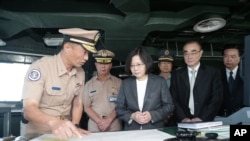In a recent interview with The Washington Post, Taiwan's President Tsai Ing-wen talked about Taiwanese-mainland relations, Taiwan independence, U.S.-Taiwan relations and the reason for Taiwan’s rejection of the international arbitration of the South China Sea dispute.
In the rare, one-on-one interview — Tsai's first since assuming office — she said her party expected Chinese President Xi Jinping to show a greater flexibility in handling cross-strait relations while recognizing that the island nation's democratically elected legislators are obligated to respect public opinion.
In response to the question of whether Xi has a certain deadline for her to accept the "1992 consensus" — in which both sides insist there is “one China” but agree to disagree on what this means — Tsai said “it isn’t likely that the government of Taiwan will accept a deadline for conditions that are against the will of the people."
"I hope that [Xi] can appreciate that Taiwan is a democratic society in which the leader has to follow the will of the people," she said.
Taiwan-mainland relations
Around the time of the inauguration, Tsai — the first woman to hold Taiwan's presidency — said she tried to narrow the gap between the two sides in terms of bilateral relations, and that she hoped Beijing had recognized her goodwill efforts.
“Over this past period we have handled relations with China very carefully," she said. "We do not take provocative measures, we make sure that there are no surprises, and we hope that through channels of communication, we can gradually build up trust."
Independence, unification
Because many young Taiwanese people are more pro-independence than older generations, the Post reporter said, they think of themselves as being distinctly Taiwanese, and not Chinese. It could be difficult for Tsai to balance the pressure to please her followers with the need to maintain stable cross-strait relations, the report suggested.
“Different generations and people of different ethnic origins have different views on China," Tsai said. "But they all agree on one thing — that is democracy.”
US-Taiwan relations
On the question of U.S.-Taiwan relations, Tsai said that regardless of whether Republican Donald Trump or Democrat Hillary Clinton won the upcoming presidential election, she hoped to develop closer relations and mutually beneficial relations. She also said she hoped the United States would provide military support to Taiwan, including submarines, ships and air defense apparatus, as well as network security.
South China Sea dispute
Lastly, Tsai reiterated Taiwan's refusal to accept a Hague tribunal's recent ruling on South China Sea arbitration, which was decided in favor of the Philippines.
“We will not accept their decision," she said. "There are a couple of reasons for that. Taiwan is an important interested party in this case, but we were not invited to participate in the proceedings. Secondly, we found it unacceptable that we were referred to as the Taiwan Authority of China. The third reason is that [Taiping Island really is] an island.”
Tsai went on to elaborate on Taiwan’s position regarding the South China Sea dispute, which she said should be settled peacefully based on international law, including the U.N. Convention on the Law of the Sea. Taiwan should be included in multilateral dispute settlement mechanisms, she added, saying that all countries involved are obliged to maintain freedom of flight and navigation throughout the disputed maritime region.
Taiwan advocates "shelving disputes and seeking common development," she said.
This report was produced in collaboration with VOA's Mandarin service.






